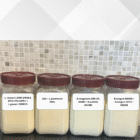Skin Microbiome: Secret to Radiant Glowing Skin
Did you know that the human skin is the home to trillions of microorganisms including, bacteria, fungi, and viruses? Unlike the gut microbiome, the skin microbiome also plays an essential role to protect skin from pathogens, harmful germs and toxins. In this blog, we will provide you with a better understanding of the skin microbiome.

What Is The Microbiome
A freshly washed face looks clean but on a closer microscopic level inspection, It shows trillions of microorganisms. These harmless microorganism resides on our skin and is called skin microbiome or microbiota.
The microbiome is considered an essential helping organ of the human body because, in recent studies, it is found that the microbiome plays an important role in maintaining, overall wellbeing. Any variability of the microbiome in day to day life may impact the host health inside out.
The microbiome is a combination of both, good (beneficial for the human body) and bad (harmful that promote disease) microbes. There is not a “one size fits all” formula applied to the growth of a healthy microbiota of the skin.

Composition and Function of Skin Microbiome
Like Gut microbiome, the skin microbiome to plays a key role to protect from pathogens, infections, germs, and other toxins. There are billions of microbes present in a single square centimeter of the skin.
The skin microbes make a self-sustaining and repairing, physical barrier over the skin that helps to protect skin from dryness, pathogen, and other infections. It also provides glow and hydration to keep skin healthy. Some important functions of microbes are:
- Help to maintain pH of the skin
- Boost skin glow and immunity against acne or other pollutants
- Detoxify and protect the skin from harmful microbes
Factors Affecting the Skin Microbiome

The Composition and functions of the skin microbiome are highly influenced by intrinsic as well as extrinsic factors. Some include:
- Everyday activities such as how touching, eating, bathing can alter the equilibrium and assembly of the microbiome
- Lifestyle change and poor eating habits affect microbiome composition
- Age is a big factor,
- Some external factors, like physical, chemical and biological factors a
- It is crucial to maintain temperature, moisture, pH balance and oxygen availability for better habitat for skin microbiota
- Harsh products including shampoo and shower gel, remove the food that is essential for skin microbiota.
- New cosmetics, lotions, cream severely affects microbiome population.
- Environmental change, pollution, heat and UV rays can cause the imbalance of the microbiota species.
Probiotic Microbes For Skin Health
As we mentioned above, it is clinically proven that probiotic products contain healthy living bacteria that provide skin benefits such as anti-aging, antipollution. Almost all Lactobacilli species are good for skin but remember, not all strains are the same.
So, next time read the label carefully before purchasing any skincare product, which probiotic is present there. Some beneficial species include:
1. Dandruff : Probiotic with species L. paracasei, L. reuteri
2. Skin aging and glow: Probiotics with species L. plantarum, L. reuteri, L. brevis, L. acidophilus, L. rhamnosus, L. johnsonii
3. Acne: Probiotics with species L. plantarum, B.bifidum, L. acidophilus, L. reuteri, L. Bulgaricus. B. lactis, L. casei, L. bulgaricus
4. Eczema/Atopic Dermatitis: Probiotics with species L. casei, L. rhamnosus, S. thermophilus, B. breve, L. acidophilus, L. reuteri, B. infantis, L. salivarius
5. Psoriasis: Probiotics with species L. paracasei L. pentosus, and B. infantis.
6. Rosacea: 50-100 billion CFU’s of multi-strain ( 12 plus) combination with lactobacilli and bifidobacterium.
7. Skin inflammation: Probiotics with species L. acidophilus, L. plantarum, and L. paracasei

Benefits of probiotics on Healthy Skin
You can get probiotics in both ways dietary as well as topical applications, and your skin will get benefited by both ways:
By Dietary Food
- Probiotic from the diet as fermented foods regulates skin immunity
- Probiotics through good supplements
- Reduces hyperactive immune responses caused by allergens
- Neutralizes harmful pathogens in the gut itself
- Shows antioxidant properties, and provide protection against pollutants
By Topical Application
- Shows antibacterial and antimicrobial effects
- Support wound healing
- Promotes skin hydration
- Increases skin immunity
- Lowers inflammation
Microbiome Imbalance and Skincare
Because the microbiome is so diverse, different microorganisms, are responsible for different skin conditions.
| Condition | Examples of Microorganisms Involved |
|---|---|
| Acne | P. acnes, S. epidermidis |
| Atopic Dermatitis | S. Aureus |
| Rosacea | B. oleronius, S. epidermidis |
| Dandruff | Malassezia species |
| Psoriasis – Scalp | Malassezia |
| Psoriasis – Skin | Candida, S. aureus |
| Diaper Rash | C. albicans |
| Beard Irritation | Tinea, S. Aureus, Candida |
Microbiome-related products that help in rebalancing and maintaining a healthy balance of good bacteria, categorized into four approaches:
- Prebiotic Products– promote good microbes growth and reduce harmful microorganisms
- Probiotic Products– contains live bacteria that provide health benefits on application or consumption.
- Postbiotic Products– contains metabolic byproducts such as enzymes, lactic acid and peptides
- Biome Support– These skin care products do not contain any ingredients that harm good skin bacteria.
Benefits of Prebiotics on Healthy Skin
Prebiotics help to get flawless, healthy skin as it increases good bacterial growth and inhibits harmful bacteria. You can get prebiotics in both ways dietary as well as topical applications, In both will get different benefits:
By Dietary Food
- Dietary sources such as onions, leeks, chicory, garlic, artichoke, green bananas, green peas, lentils, beans, nuts and seeds
- Protects skin moisture
- Fight against the inflammatory reactions caused by environmental pollutants
- Preserve skin connective tissues and delay ageing
By Topical Application
- Promote healthy bacterial growth on the skin
- Reduce harmful bacteria
- Support skin hydration
Integrative Nutrition
- Microbiome diet and anti-inflammatory diet as microbes friendly diet
- Polyphenols rich diets for antioxidants from plant-based diets
- Fermented beverages such as kombucha, kefir
- Fermented foods such as yoghurt, cultured vegetables, pickles, natto, tampeh, sauerkraut
- Herbs and spices such as cloves, oregano, thyme, fennel, coriander, cinnamon, cumin, turmeric, basil, garlic, black pepper, ginger, rosemary
- Tea such as black and green tea, clove tea, fennel tea, ginger tea, kombucha tea
Key Supplements
- Prebiotics fiber such as inulin, FOS, acacia senegal, pectins
- Multistrain probiotics (50-100 billion CFUs) and at least 12 strains from the above-discussed strains
Conclusion
It is very crucial to understand the importance of the microbiome for healthy and glowing skin. Balance moisture helps the healthy microbiome growth. It is more important for sensitive and soft skin as it reduces the chances of infection, inflammation and provides protection from environmental factors like pollution and ultraviolet rays.
The researches on skin microbiome and our overall well-being are still on. It is essential to maintain a healthy balance of microbes, both intrinsic and extrinsic factors affect the microbiota growth, we should mind carefully what we are feeding to our skin because every minute factor affects the integrity of the microbiome and can lead to damage to the skin.









